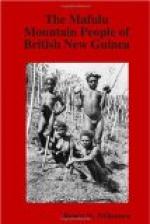Property and Inheritance.
The property of a Mafulu native may be classified as being (1) his movable belongings, such as clothing, ornaments, implements and pigs; (2) his house in the village; (3) his bush land; (4) his gardens.
The movable belongings are, of course, his own absolute property.
The village house is also his own; but this does not include the site of that house, which continues to be the property of the village. Every grown-up male inhabitant of the village has the right to build for himself one house in that village; he is not entitled to have more than one there, but he may have a house in each of two or more villages, and a chief or very important man is allowed two or three houses in the same village. On a house being pulled down and not rebuilt, or being abandoned and left to decay, the site reverts to the village, and another person may build a house upon it. [65] Houses are never sold, but the ordinary life of a house is only a few years.
The man’s bush land is his own property, and his ownership includes all trees and growth which may be upon it, and which no other man may cut down, but it does not include game, this being the common property of the community; and any member of the community is entitled to pass over the land, hunt on it, and fish in streams passing through it, as he pleases. The whole of the bush land of the community belongs in separate portions to different owners, one man sometimes owning two or more of such portions; and it is most remarkable that, though there are apparently no artificial boundary marks between the various portions, these boundaries are, somehow or other, known and respected, and disputes with reference to them are practically unknown. How the original allocations and allotments of land have been made does not appear to be known to the people themselves.




